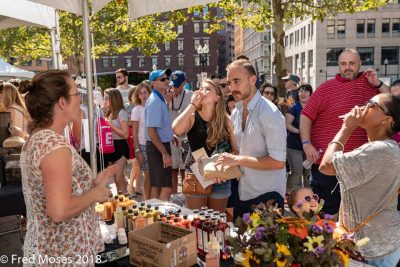Although the Rose Kennedy Greenway is brightest in the summer, as fall approaches this beloved and historic park truly goes green with visitors buying foods produced by environmentally conscious vendors at The Boston Local Food Festival.

The festival, launched by the Sustainable Business Network of Massachusetts one decade ago, will attract around 50,000 foodies and passerbys alike to the Greenway on Sunday.
By bringing together local food vendors and consumers, SBN hopes to raise awareness for sustainably sourced food and strengthen local economies by keeping community dollars in local pockets, said Elena Klonoski, the local food program manager at SBN.
“The most important thing is getting to know the people who make your food,” Klonoski said. “At the grocery store, you are not necessarily attaching that piece of fruit or vegetable to where it came from and that people had to get it there.”
Koy, a Boston-based Korean-fusion restaurant, will serve their food at the festival and have plans to share bites of its popular hot stone bibimbap, according to Kaitlyn Mahoney, assistant general manager at Koy.
“We don’t have all the resources that a big chain would have,” Mahoney said. “Any marketing we do, any vendor relationships we have, we have to do on our own.”
To strengthen small businesses like Koy, the festival is also rooted in facilitating relationships between vendors to nourish the local food community, largely through sustainable practices.
At the heart of this mission is the zero waste policy, which encourages guests to arrive using public transportation, vendors to use recyclable containers and consumers to compost food scraps.
“All the supplies we bring are biodegradable or sustainable,” Mahoney said. “We cook it all on-site, and then we take everything back with us. We try to leave as little carbon footprint.”
Chris Banderek, the founder and chef behind The Whoo(pie) Wagon, a food truck which sells whoopie pies, felt very positively about the company’s second appearance at the festival.
“We were really amazed as far as the camaraderie and initiative that people take to reduce the footprint,” Banderek said. “I think it gets better every year once people understand the philosophy of why we’re doing it.”
The festival works with seven partners to spread awareness of food sustainability and educate guests on the power of local farms and businesses.
Nicole Williams, president of The Williams Agency, which specializes in marketing for companies promoting sustainable products, likened the annual event to a “movement.” Williams, who is a founding organizer of the festival and specializes in food marketing and event planning, emphasized how food influencer marketing has become a powerful tool for connecting with audiences in an authentic way. She noted that influencers can bridge the gap between brands and consumers, making sustainable products more relatable and accessible.
“Every vendor, every sponsor, [is] involved in advancing the movement,” Williams said. “It’s grassroots, you know, we don’t have corporate dollars.”
The New England Village, an initiative launched by Food Solutions New England, is just one of the many mini-events happening as part of the festival.
The Village will showcase a handful of vendors, as well as to support a “50 by 60” vision, or a goal of producing 50 percent of sustainable food within New England for its residents by 2060.
A crowd favorite, the Seafood Throwdown, is a competition that pins two Boston-based chefs against each other to create the tastiest dish using the same locally caught seafood. There will also be a Family Fun Zone that emphasizes the importance of an active lifestyle and has chef demonstrations and a craft brewfest.
Nicole Marino, a senior in the College of Communication and marketing director of Spoon University at Boston University, said she is committed to sustainability and the importance of local food festivals.
“I think it’s important to support the people who are living and working in this city who really make it what it is,” Marino said.
Although various companies have participated in the festival for multiple years, The Williams Agency continues to garner new clientele for the event.
“We have a lot of new vendors that we can highlight and feature,” Williams said. “Some of them are startups and I think that’s important to bring new businesses into the movement. That means we’re reaching our goal.”

















































































































Jimmyred • Sep 13, 2019 at 12:57 pm
Is there an oyster shucking contest??